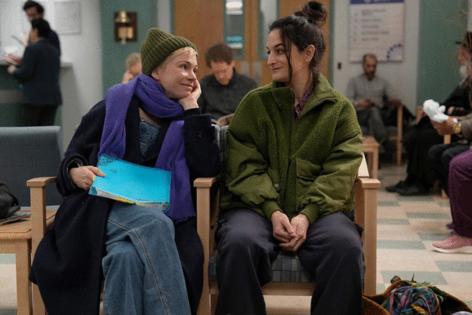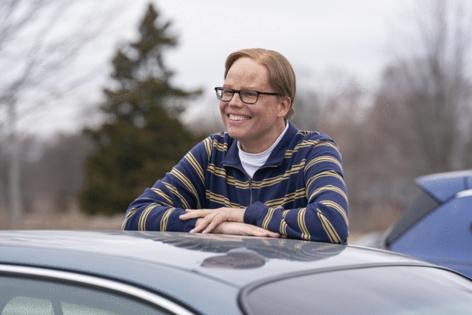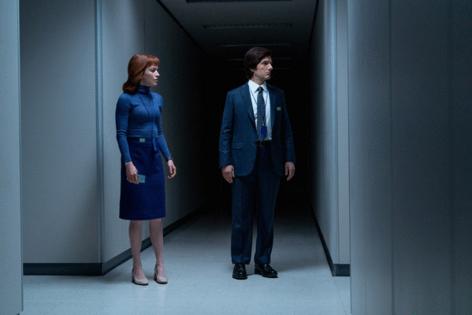Mary McNamara: Why the Emmys still matter in a time of turmoil
Published in Entertainment News
LOS ANGELES — The 77th Emmys nominations have been announced and given the state of just about everything, it’s easy not to care.
Our president is dismantling large portions of the federal government and offering new tax breaks to folks like those portrayed behaving badly in “The White Lotus.” Flash floods, a potential measles epidemic and ongoing bloody wars in Ukraine and the Middle East seem to echo the pre-apocalyptic drumbeats from “Paradise.”
Masked federal ICE agents, who look like they could be part of the Federal Disaster Response Agency from “The Last of Us,” roam the streets of Los Angeles, arresting people who might not have the right documentation and taking them to detention centers that appear to be right out of “The Handmaid’s Tale.”
Television itself is in a state of free fall, with streaming prices rising even as the number of new series sharply declines, and though “The Studio” makes it seem as if L.A. remains the geographic center of the entertainment business, the city’s increasingly empty soundstages and unemployed production workers tell another story.
So given that many Americans might very well agree to work for “Severance’s” sinister Lumon Industries if it guaranteed a decent paycheck and health care benefits, it seems impossible to gin up excitement about how many nominations HBO/Max, Netflix, Apple TV+ or any other entertainment conglomeration with an obscenely overpaid CEO received this year.
Except, you know, Jeff Hiller, whose amazing midlife breakout role as nakedly sincere Joel in “Somebody Somewhere” finally got the nomination it deserved. Or Jenny Slate, who deftly spun plates of hilarity, humanity and pathos in “Dying for Sex.” Stripped of his good looks and seductive accent, Colin Farrell still managed to mesmerize in “The Penguin,” which not only resuscitated an exhausted genre but took it to a new level of storytelling.
From its 15-year-old star to its risky single-shot direction and unsettlingly resonant themes, the limited series “Adolescence” was as close to perfection as a piece of television gets. Jean Smart (“Hacks”), Kathy Bates (“Matlock”) and Catherine O’Hara (“The Studio”) continue to prove the absurdity of Hollywood’s traditional sidelining of women over 40, while “Abbott Elementary” reminds us just how good a traditional broadcast comedy can be.
Artistic awards of any kind are inevitably absurd — how does one relatively small group of people decide what is “best” — and given the amount and diversity of television, the Emmys are more absurd than most.
According to Television Academy Chairman Cris Abrego, this was a record-breaking year in terms of voter turnout. Even so, it’s difficult to see categories dominated by one or two shows and not wonder how much TV the voting members managed to watch. If it were just a question of judging shows on submitted episodes, there would be no need for pricey FYC campaigns after all.
But the Emmys matter because television is art. And art matters. Even if it involves complaining about how ridiculous this year’s choices are, the nominations give us an opportunity to talk about art — what touched/impressed/moved/changed us, or not. What comforted us, disturbed us, made us laugh or look at things just a little differently and why.
That’s important, especially now when so much is in a constant state of upheaval, when everywhere we look people are questioning the future of democracy, civilization, the planet. Television can be used as an escape from “real life” — and heaven knows we could all use some of that — but it’s existence, and our appreciation of it, is very much part of that real life.
Art is a hallmark of civilization. It’s proof that we have evolved beyond the basic instincts of survival, that we understand the necessity of stories, images and music, and that we encourage their creation and appreciate the existence of even those things we personally do not perceive as great or even good.
Even as Peak TV gives way to the age of contraction, television remains one of our most universally experienced art forms. At its most basic level, it’s about curiosity — we watch television, whether it’s “Slow Horses,” “The Pitt” or “The Traitors” — to see what other people are up to, what they feel, say and do in a wide variety of circumstances and if we would feel, say or do something similar.
So yeah, the Emmys are not as important as ICE raids, flash floods, children dying of measles or the vanishing social safety net. When climate change has made the world so hot that the World Cup is under threat, it’s easy to consider conversations about why “Squid Game” or the final season of “The Handmaid’s Tale” received no major nominations, or how academy members could nominate Martin Short and not Steve Martin for “Only Murders in the Building,” a complete waste of time.
Until you consider the alternative. Because the day we stop celebrating and arguing about art is the day we’ll know the bastards have won.
———
(Mary McNamara is a culture columnist and critic for the Los Angeles Times.)
———
©2025 Los Angeles Times. Visit at latimes.com. Distributed by Tribune Content Agency, LLC.


















Comments